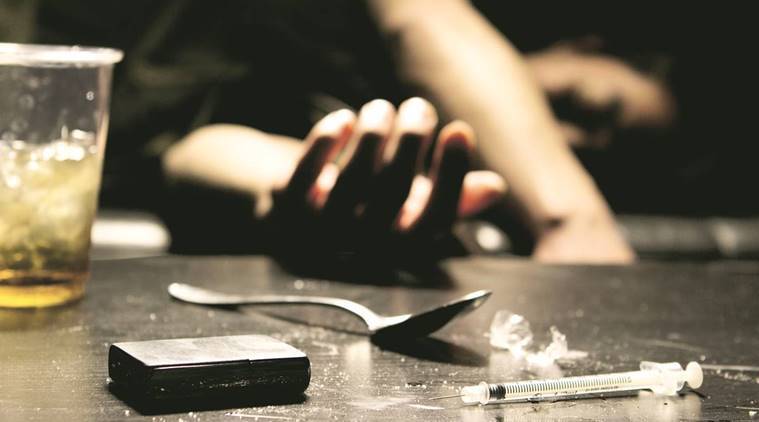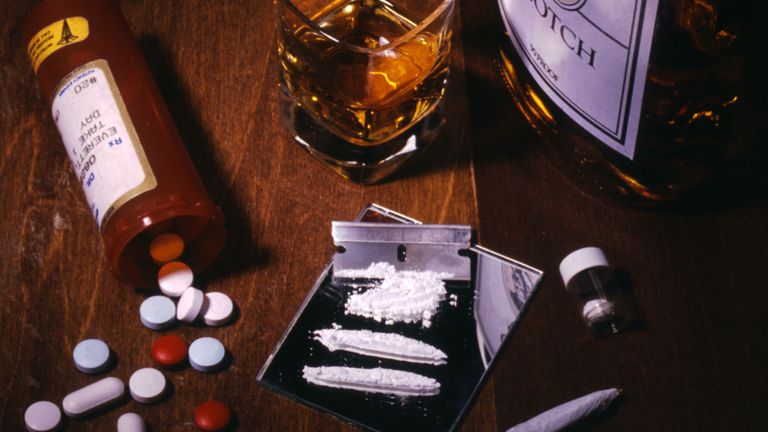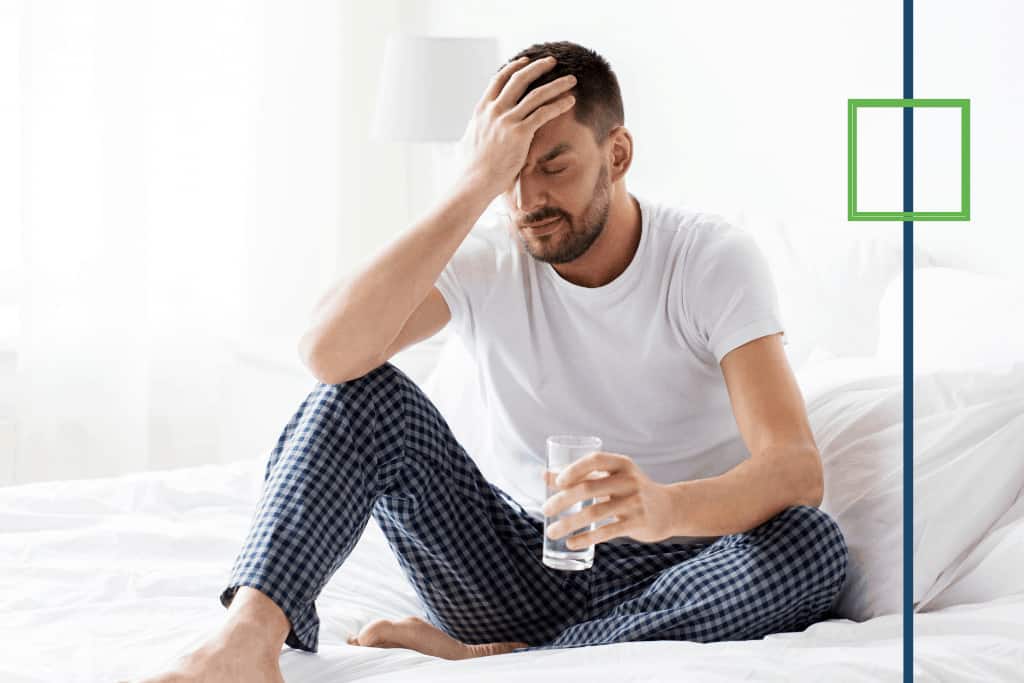Heroin Withdrawal
Heroin (diacetylmorphine) is a very addictive drug made from morphine, a psychoactive (mind-altering) drug taken from the resin of the seed pod of the opium poppy plant. What are the symptoms of heroin addiction? In just a single dose of heroin, the body adjusts to the drug and craves more. Users can experience withdrawal symptoms of heroin after just after seventy-two hours of use. What does heroin do to the brain? Excessive use of heroin can cause a lack of oxygen to the brain leading to overdose and long-term effects on movement. vision, mood, and other vital functions. Can you snort heroin? Powder heroin is commonly snorted up the nose through a rolled-up dollar bill.
People using heroin regularly (for example: daily) over a long period of time may experience heroin withdrawal when stopping or reducing their heroin intake. In 2018 in the United States, about 808,000 people reported using heroin during the past year [1]. In the same year, about 11.4 million people used narcotic pain relievers without a prescription. What does a heroin addict look like? How long does it take to withdraw from heroin? Individuals who use heroin may experience some withdrawal for up to 3 or 4 weeks. Careful planning can assist a person with heroin withdrawal, requiring professional assistance from a heroin addiction treatment center.
Heroin use can result in tolerance to and dependence on the drug. Individuals need more of the drug when tolerance happens to achieve the same effect. Dependence on heroin means the person must use heroin to stop withdrawal symptoms. The primary risk associated with heroin withdrawal is subsequent overdose due to loss of tolerance.
When you build a tolerance to heroin, you need to take more of it to feel high. Eventually, you can become physically and psychologically dependent on the drug. Chronic heroin use alters the nerve receptors in your brain. They come to depend on opioids, particularly heroin, to function. If you stop using heroin or reduce the amount you take, you may experience heroin withdrawal symptoms. The withdrawal symptoms represent your body’s physical response to the absence of heroin.

Get Help. Get Better. Get Your Life Back.
Searching for Accredited Drug and Alcohol Rehab Centers Near You?
Even if you have failed previously and relapsed, or are in the middle of a difficult crisis, we stand ready to support you. Our trusted behavioral health specialists will not give up on you. When you feel ready or just want someone to speak to about therapy alternatives to change your life call us. Even if we cannot assist you, we will lead you to wherever you can get support. There is no obligation. Call our hotline today.
(844) 597-1011Withdrawal Symptoms Heroin
One of the many heroin side effects and the primary reason heroin can be damaging is that it suppresses the normal functions of the central nervous system (CNS). As a result, it can harm your breathing, body temperature, and blood pressure. Since opioids like heroin bind to opioid receptors in the brain, the person using the drug can end up with changes in brain chemistry that affect how they experience pleasure and pain. How long does a heroin high last? When someone goes through heroin withdrawal, they may experience sensations opposite the highs they previously enjoyed. For instance, the heart rate can slow, and they may feel anxious or depressed.
Withdrawals from heroin usually last about a few weeks. However, the experience is different for everyone. Several factors play a role in how the body reacts to heroin withdrawal. These may include the amount of heroin taken in each dose, how long heroin was abused, and how the person ingested the drug (can you snort black tar heroin? smoking black tar heroin, shooting heroin, or boofing). Withdrawals from heroin may also be influenced by underlying mental health problems or a prior history of opioid abuse.
Here are some of the most common heroin withdrawal symptoms:
Heroin Cravings
Most people who are experiencing heroin withdrawal undergo a strong urge to take more heroin. This is known as “experiencing cravings” and is very common among people withdrawing from many addictive substances. Part of the craving is motivated by the desire to reduce the symptoms of heroin withdrawal, and part of it is the yearning to re-experience the pleasure of the heroin high.
Heroin Mood Changes
Feeling depressed, anxious, or irritable, also known as having a “dysphoric mood”, is a common symptom of heroin withdrawal. Even without a traumatic past, it is expected to experience these mood changes, but many people who use heroin experience long-suppressed feelings connected to abuse or past trauma when they come off the drug. This is why it is crucial to have emotional support while going through heroin withdrawal. These feelings become less intense once the heroin withdrawal stage is over.
Heroin Fever
Body temperature differs from person to the next, as well as factors like time of day and menstrual cycle, but usually, a temperature of 99–99.5 F (37.2–37.5 C) is considered a fever in adults. A fever is one way your body combats infections and disease, but when a person goes through heroin withdrawal, the fever does not serve a practical purpose in fighting infection. Ask medical assistance if your temperature exceeds 103 F and doesn’t come down with treatment. If you have a severe medical condition, such as a heart problem, diabetes, sickle cell anemia, HIV, or cystic fibrosis, or if you have a seizure, get immediate help.
Stomach Pain and Diarrhea
Diarrhea or watery and frequent bowel movements are also common with heroin withdrawal. These withdrawal symptoms may be accompanied by stomach pain caused by spasms in the digestive system. The discomfort of diarrhea and stomach pain may make it challenging to go about your routine.
Vomiting and Nausea
Although these are distressing symptoms, nausea and vomiting are normal to heroin withdrawal. It wears you out, makes you uncomfortable, puts you off your food, and keeps you close to the bathroom.

Restlessness and Sleep Problems
Individuals going through heroin withdrawal usually experience restlessness, which, coupled with insomnia and anxiety, can simultaneously make you feel agitated and tired. Heroin withdrawal often causes sleep problems, particularly insomnia. Yawning is also common.
Coping & Relief
While heroin withdrawal can be uncomfortable and intense, the worst symptoms usually pass within a week. During this time, there are some things that you can do to help yourself feel more comfortable.
Pains and Aches
One of the primary roles of opioids is to block the body’s pain pathways. When you go through heroin withdrawal, there is a rebound effect, and you feel achy, particularly in the legs and back, and more sensitive to pain.
Excessive Bodily Fluids
As you undergo heroin withdrawal, you may encounter an overproduction of bodily fluids, such as sweat, tears, and a runny nose. You may also notice your hair standing on end. As with other physical withdrawal symptoms, these responses are part of your body, bringing itself into balance.

Get Your Life Back
Find Hope & Recovery. Get Safe Comfortable Detox, Addiction Rehab & Dual Diagnosis High-Quality Care.
Hotline(844) 597-1011Can You Die From Heroin Withdrawal?
Withdrawing from any kind of opioid can be lethal. That is why the safest way to get rid of this drug from your body (detox) is under medical care. As uncomfortable as heroin withdrawal symptoms are, they aren’t usually life-threatening. However, they are painful and uncomfortable enough to make at-home detox dangerous. During an at-home detox, a person starts to crave heroin while also experiencing withdrawal symptoms. To ease their pain, they use heroin. However, now that they are clean, their body is no longer accustomed to the drug. They may return to using the same amount as they previously did, but it can be overwhelming for their body, causing an overdose and death.
Another reason why people die from heroin withdrawal is excessive vomiting and diarrhea. Untreated, these symptoms can rapidly dehydrate the body and cause dangerously high sodium levels to accumulate in the blood (hypernatremia), and the heart can fail. Such incidents happen when people withdraw from heroin on their own. Such deaths can be averted by medical supervision in a professional detox facility.
People can and do, die from heroin withdrawal. The recent substantial increases in heroin use in the United States make managing heroin withdrawal a major clinical issue. Heroin withdrawal needs to be recognized as potentially life-threatening and managed accordingly. Heroin withdrawal is not a trivial matter. The rising number of deaths from withdrawal in United States jails has received little attention. Given appropriate clinical management, such deaths need not occur.
First-class Facilities & Amenities
World-class High-Quality Addiction & Mental Health Rehabilitation Treatment
Rehab Centers TourRenowned Addiction Centers. Serene Private Facilities. Inpatient rehab programs vary.
Addiction Helpline(844) 597-1011Proven recovery success experience, backed by a Team w/ History of:
15+
Years of Unified Experience
100s
5-Star Reviews Across Our Centers
10K
Recovery Success Stories Across Our Network
- Low Patient to Therapist Ratio
- Onsite Medical Detox Center
- Comprehensive Dual-Diagnosis Treatment
- Complimentary Family & Alumni Programs
- Coaching, Recovery & Personal Development Events
How Long Does It Take to Withdraw From Heroin?
Another common question is about how long heroin withdrawals will happen. Heroin leaves the body within a matter of days. The digestive system works to metabolize and remove it from the body over a few days. Yet, how long this takes depends on the amount of the substance used and factors such as how healthy your body is and if it can metabolize substances quickly.
Heroin withdrawals will continue until your body and brain are forced to move beyond their dependence. This is a difficult period for some people. That is why most heroin addiction treatment centers offer a comprehensive treatment program incorporating medications that ease the brain off heroin. It takes less pain and frustration to get beyond that withdrawal then. For most people, you can start feeling better in a few days.
Heroin Withdrawal Timeline
Withdrawal symptoms of heroin may develop rapidly. For instance, a person with a strong physical dependence might begin to experience them in hours. Over the following days, the withdrawal symptoms become more intense before peaking and then gradually subsiding. The National Institute on Drug Abuse (NIDA) reports that while heroin withdrawal symptoms tend to improve after a week, they may sometimes stay for months.
The terrible withdrawal symptoms may peak after about a week of no drugs and typically last up to 14 days. So you initially start feeling symptoms within a day, which is why someone with an addiction to heroin wants to have this drug in their system at all times. But the symptoms can get progressively worse for up to a week and then last up to two weeks until it’s totally out of their system.
Day 1
The body metabolizes heroin rather quickly, leading one to experience the onset of withdrawal symptoms within 8-24 hours of last use. The earliest signs and symptoms of heroin withdrawal can include muscle aches, yawning, runny nose, insomnia, increased heart rate, blood pressure, sweating, fever, and anxiety.
Day 2 to 3
People feel the worst symptoms between 48-72 hours after the last use – including severe muscle aches, excessive sweating, lethargy, anxiety, and restlessness. Cravings are usually very strong during this period too.
Day 4 to 10
Withdrawal can last between 5 and 10 days, depending on the person and how long they used heroin, but some psychological symptoms can stay for months. The terrible withdrawal symptoms may peak after about a week of no drugs. After that, they typically last up to 14 days. So you initially start feeling symptoms within a day, which is why people with addiction want to have this drug in their system at all times. But the symptoms can get progressively worse for up to a week and then last up to two weeks until it’s totally out of their system.

World-class, Accredited, 5-Star Reviewed, Effective Addiction & Mental Health Programs. Complete Behavioral Health Inpatient Rehab, Detox plus Co-occuring Disorders Therapy.
CALL(844) 597-1011End the Addiction Pain. End the Emotional Rollercoaster. Get Your Life Back. Start Drug, Alcohol & Dual Diagnosis Mental Health Treatment Now. Get Free No-obligation Guidance by Substance Abuse Specialists Who Understand Addiction & Mental Health Recovery & Know How to Help.
Heroin Detox Treatment Near Me
Heroin addiction is a chronic disease and should be treated like other chronic diseases. Like those, it should constantly be monitored and managed. Heroin is a type of opioid. Opioid addiction treatment is different for each individual. The main purpose of opioid addiction treatment is to help the person stop using the drug. Opioid addiction treatment can also help the person avoid using it again.
The body goes through specific symptom stages known as the opioid withdrawal timeline. The opioid withdrawal timeline varies from a few days to a few weeks, depending on the type of opioid used, how long it was used, and any other substances that may have been used in conjunction with opioids. Medically managed withdrawal opioid detox ensures the individual remains safe and stays as comfortable as possible.
Heroin Detox Treatment
The first step in treatment is medical detox. It will help you navigate the complicated withdrawal process but doesn’t address patterns of thought and behavior contributing to heroin addiction. Various treatment approaches and settings can help provide the ongoing support necessary to maintain long-term sobriety after you complete detox.
Cravings are very common during detox and can be challenging to overcome. This often leads to relapse. Constant medical care provided during inpatient treatment helps prevent relapse. Clinicians can give necessary medication and medical expertise to lessen cravings and the effects of withdrawals.
Heroin Withdrawal Treatment Inpatient
There isn’t one treatment approach or style that will suit everyone. Treatment should speak to the needs of the individual. Inpatient drug rehab and addiction treatment aren’t just about drug or alcohol use. the goal is to help the person stop using drugs like heroin. Drug and alcohol rehab should also focus on the whole person’s needs.
Addiction is a complex but treatable disease that affects brain function and behavior. When someone or their family is considering different treatment facilities, they should account for the complexity of addiction and the needs of the individual. The objective of attending an inpatient drug and alcohol rehab center for addiction treatment is to stop using the drug and re-learn how to live a productive life without it.
Most people benefit from inpatient rehab after a full medical detox from drugs and alcohol. Inpatient drug rehab can last anywhere from 28 days to several months. Patients stay overnight in the rehab facility and participate in intensive treatment programs and therapy. Once someone completes rehab, their addiction treatment team will create an aftercare program, including continuing therapy and participation in a 12-step program like Alcoholics Anonymous and Narcotics Anonymous.
Experience Transformative Recovery at We Level Up Treatment Centers.
See our authentic success stories. Get inspired. Get the help you deserve.
Start a New Life
Begin with a free call to an addiction & behavioral health treatment advisor. Learn more about our dual-diagnosis programs. The We Level Up Treatment Center Network delivers recovery programs that vary by each treatment facility. Call to learn more.
- Personalized Care
- Caring Accountable Staff
- World-class Amenities
- Licensed & Accredited
- Renowned w/ 100s 5-Star Reviews
We’ll Call You
Psychotherapy
Many rehab programs will also have early morning classes or programs. Group sessions occur during inpatient rehab, as do individual therapy sessions. Family therapy may be part of inpatient rehab when it’s feasible. Alternative forms of therapy may be introduced during inpatient rehab, like a holistic therapy program, yoga for addiction recovery, or addiction treatment massage therapy.
Several different modalities of psychotherapy have been used in the treatment of mental health disorders along with addiction, including:
- Cognitive Behavioral Therapy (CBT) – is an effective treatment that involves changing both the patterns of negative thoughts and the behavioral routines which are affecting the daily life of the depressed person for various forms of depression.
- Dialectical Behavioral Therapy – is a comprehensive mental health and substance abuse treatment program whose ultimate goal is to aid patients in their efforts to build a life worth living. The main goal of DBT is to help a person develop what is referred to as a “clear mind.”
- Solution-focused therapy is an approach interested in solutions that can be quickly implemented with a simple first step leading to further positive consequences.
Dual Diagnosis Treatment
Drug abuse and mental health disorders often co-occur. In many cases, traumatic experiences can result in a mental health disorder and substance abuse. Dual diagnosis rehabilitation treats both of these issues together. The best approach for the treatment of dual diagnosis is an integrated system. This strategy treats both the substance abuse problem and the mental disorder simultaneously. Regardless of which diagnosis (mental health or substance abuse problem) came first, long-term recovery will depend mainly on the treatment for both diseases done by the same team or provider.
Medication Assisted Treatments (MAT)
Medication-Assisted Treatments (MAT) for substance use and mental health disorders are commonly used in conjunction with one another. This includes the use of medications and other medical procedures. During your rehab, the staff from your treatment facility will help you identify what caused your addiction and teach you skills that will help you change your behavior patterns and challenge the negative thoughts that led to your addiction. Sometimes, the pressures and problems in your life lead you to rely on substances to help you forget about them momentarily.
Please, do not try to detox on your own. The detox process can be painful and difficult without medical assistance. However, getting through the detox process is crucial for continued treatment. We Level Up provide proper care with round-the-clock medical staff to assist your recovery through our opioid addiction treatment program medically. So, reclaim your life, and call us to speak with one of our treatment specialists. Our counselors know what you are going through and will answer any of your questions.

Search Florida Rehab Centers & Other Resources
Sources:
[1] [2] NIDA – https://www.drugabuse.gov/publications/drugfacts/heroin
[3] CDC – https://www.cdc.gov/
[4] NIH – https://medlineplus.gov/ency/article/000949.htm
[5] Heroin Withdrawal – https://welevelupnj.com/addiction/heroin-withdrawal/


